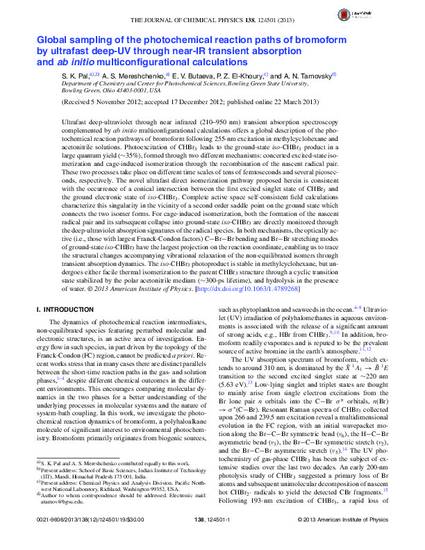
Ultrafast deep-ultraviolet through near infrared (210-950 nm) transient absorption spectroscopy complemented by ab initio multiconfigurational calculations offers a global description of the photochemical reaction pathways of bromoform following 255-nm excitation in methylcyclohexane and acetonitrile solutions. Photoexcitation of CHBr3 leads to the ground-state iso-CHBr3 product in a large quantum yield (∼35), formed through two different mechanisms: concerted excited-state isomerization and cage-induced isomerization through the recombination of the nascent radical pair. These two processes take place on different time scales of tens of femtoseconds and several picoseconds, respectively. The novel ultrafast direct isomerization pathway proposed herein is consistent with the occurrence of a conical intersection between the first excited singlet state of CHBr3 and the ground electronic state of iso-CHBr3. Complete active space self-consistent field calculations characterize this singularity in the vicinity of a second order saddle point on the ground state which connects the two isomer forms. For cage-induced isomerization, both the formation of the nascent radical pair and its subsequent collapse into ground-state iso-CHBr3 are directly monitored through the deep-ultraviolet absorption signatures of the radical species. In both mechanisms, the optically active (i.e., those with largest Franck-Condon factors) C-Br-Br bending and Br-Br stretching modes of ground-state iso-CHBr3 have the largest projection on the reaction coordinate, enabling us to trace the structural changes accompanying vibrational relaxation of the non-equilibrated isomers through transient absorption dynamics. The iso-CHBr3 photoproduct is stable in methylcyclohexane, but undergoes either facile thermal isomerization to the parent CHBr3 structure through a cyclic transition state stabilized by the polar acetonitrile medium (∼300-ps lifetime), and hydrolysis in the presence of water. © 2013 American Institute of Physics.
Available at: http://works.bepress.com/alexander_tarnovsky/2/
